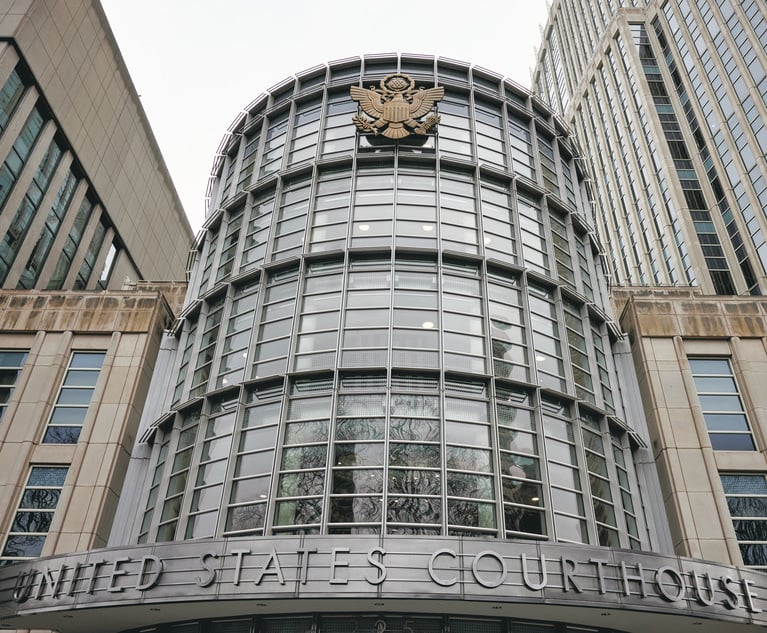NCAA Opens Probe Into Indicted Coaches in College Admissions Scandal
The NCAA has announced it is looking into allegations against the indicted coaches for possible violations of its rules with colleges and their in-house counsel caught in the crossfire.
March 14, 2019 at 08:00 AM
5 minute read
The original version of this story was published on Corporate Counsel
 Yale University/image by Shutterstock
Yale University/image by Shutterstock
While eight universities and their general counsel try to determine the legal liabilities in a nationwide college cheating scandal, the national organization that oversees college sports has announced it is looking into allegations against the indicted coaches for possible violations of its rules.
The NCAA released a statement Tuesday announcing the probe and saying, “The charges brought forth [Tuesday] are troubling and should be a concern for all of higher education.”
In all 50 people have been indicted, including nine coaches and 33 parents, some of them wealthy celebrities. Most of their hearings have been set for later this month in U.S. District Court in Boston.
The scheme had two prongs, according to the indictment. One involved bribes to manipulate students' admission test scores; another used bribes so coaches of low-profile sports would add names to their preferential admissions list for athletes. Eight schools were involved: Yale, Stanford, University of Texas, Georgetown, Wake Forest, University of Southern California, University of San Diego, and the University of California, Los Angeles.
On the testing front, ACT Inc., a nonprofit group that administers a much-used standardized admissions test, has issued a statement saying it was cooperating with the federal investigation. Two of its testers were indicted.
“ACT contracts with thousands of people to locally administer the [test] around the country. These individuals certify to follow ACT's policies and procedures to administer the test. In these cases, the two charged individuals allegedly did not follow ACT's rules,” the statement said.
The College Board, another nonprofit group that administers a widely used college admission test called the SAT, issued a statement Wednesday that said, “The College Board has a comprehensive, robust approach to combat cheating, and as part of that effort we work closely with law enforcement, as we did in this investigation.”
It said it relies on schools to select administrators and proctors “whose roles are to ensure fair testing environments for all students by following our policies and procedures. When they don't, we take appropriate action on behalf of students. Further, when schools don't comply with our policies and procedures, we reserve the right to prohibit them from administering future tests.”
 Gregg Clifton of Jackson Lewis. Courtesy photo.
Gregg Clifton of Jackson Lewis. Courtesy photo.Gregg Clifton, a principal in the Phoenix office of Jackson Lewis, said one of the first things he would advise a school is to examine any potential liability based on the acts of the coaches. “The NCAA part of this will be crucial,” said Clifton, who co-chairs his firm's collegiate and professional sports practice group.
“Has any of the bribe money benefited school programs directly? Was there even a trickle down that went into a school program?” he asked. If so, the school could be liable.
John Vandemoer, former head coach of Stanford's sailing team, has already pleaded guilty to accepting $160,000 “as a deposit” in exchange for a spot on his sailing team. He said he never kept the money for himself, and instead used it to purchase new equipment for the team. His sentencing is scheduled for June 12.
The NCAA has authority to levy huge fines if it finds a school at fault. The U.S. Department of Justice did not accuse any of the schools of wrongdoing, and referred to them as victims.
NCAA bylaws require the schools to control the amount of compensation that coaches receive. One bylaw specifically prohibits athletic department staff members from receiving unreported, supplemental compensation from a third party.
Clifton also said the universities will want to explore what can be done to ensure that the SAT and ACT scores can be relied on for admissions.
They need to ask, “What do we need to change to ensure the integrity of the admissions process,” he said.
Arthur Middlemiss, a partner at Lewis Baach Kaufmann Middlemiss in New York City, looks at the scandal as a compliance challenge. Middlemiss is a former in-house counsel and director of JPMorgan Chase & Co.'s global anti-corruption program.
“The colleges should be well advised to implement controls and training enhancements so nothing like this ever happens again,” he said.
In the United Kingdom, Middlemiss said, organizations can be held liable for failing to prevent a bribe or corruption. In the U.S., he said, it has more to do with “turning a blind eye” to corruption.
“So the colleges need to take whatever steps they have to to make sure this doesn't happen again,” he said.
At least one school has already done that. Georgetown University general counsel Lisa Brown released a statement saying the school strengthened its recruiting and admissions process in 2018, when it became aware of irregularities in a tennis coach's recruiting. The coach was dismissed.
“Our department of athletics and office of undergraduate admissions now perform audits to determine whether any recruited student-athletes are not on the roster of the sport for which they were recruited,” her statement said.
Georgetown's former tennis coach was one of those indicted. The school allocated him three admission spots a year to recruit players. He allegedly designated at least 12 students between 2012 and 2018 as tennis team recruits, even though some of them didn't play competitively.
For his efforts, he is accused of accepting $2.5 million in bribes labeled as “consulting fees.”
This content has been archived. It is available through our partners, LexisNexis® and Bloomberg Law.
To view this content, please continue to their sites.
Not a Lexis Subscriber?
Subscribe Now
Not a Bloomberg Law Subscriber?
Subscribe Now
NOT FOR REPRINT
© 2025 ALM Global, LLC, All Rights Reserved. Request academic re-use from www.copyright.com. All other uses, submit a request to [email protected]. For more information visit Asset & Logo Licensing.
You Might Like
View All
The Met Hires GC of Elite University as Next Legal Chief

NY Appellate Panel Cites Student's Disciplinary History While Sending Negligence Claim Against School District to Trial

'No Evidence'?: Big Law Firms Defend Academic Publishers in EDNY Antitrust Case
3 minute read
'Substantive Deficiencies': Judge Grants Big Law Motion Dismissing Ivy League Price-Fixing Claims
3 minute readTrending Stories
- 1Perkins Coie Lures Former Longtime Wilson Sonsini Tech Transactions Partner
- 2‘The Decision Will Help Others’: NJ Supreme Court Reverses Appellate Div. in OPRA Claim Over Body-Worn Camera Footage
- 3MoFo Associate Sees a Familiar Face During Her First Appellate Argument: Justice Breyer
- 4Antitrust in Trump 2.0: Expect Gap Filling from State Attorneys General
- 5People in the News—Jan. 22, 2025—Knox McLaughlin, Saxton & Stump
Who Got The Work
J. Brugh Lower of Gibbons has entered an appearance for industrial equipment supplier Devco Corporation in a pending trademark infringement lawsuit. The suit, accusing the defendant of selling knock-off Graco products, was filed Dec. 18 in New Jersey District Court by Rivkin Radler on behalf of Graco Inc. and Graco Minnesota. The case, assigned to U.S. District Judge Zahid N. Quraishi, is 3:24-cv-11294, Graco Inc. et al v. Devco Corporation.
Who Got The Work
Rebecca Maller-Stein and Kent A. Yalowitz of Arnold & Porter Kaye Scholer have entered their appearances for Hanaco Venture Capital and its executives, Lior Prosor and David Frankel, in a pending securities lawsuit. The action, filed on Dec. 24 in New York Southern District Court by Zell, Aron & Co. on behalf of Goldeneye Advisors, accuses the defendants of negligently and fraudulently managing the plaintiff's $1 million investment. The case, assigned to U.S. District Judge Vernon S. Broderick, is 1:24-cv-09918, Goldeneye Advisors, LLC v. Hanaco Venture Capital, Ltd. et al.
Who Got The Work
Attorneys from A&O Shearman has stepped in as defense counsel for Toronto-Dominion Bank and other defendants in a pending securities class action. The suit, filed Dec. 11 in New York Southern District Court by Bleichmar Fonti & Auld, accuses the defendants of concealing the bank's 'pervasive' deficiencies in regards to its compliance with the Bank Secrecy Act and the quality of its anti-money laundering controls. The case, assigned to U.S. District Judge Arun Subramanian, is 1:24-cv-09445, Gonzalez v. The Toronto-Dominion Bank et al.
Who Got The Work
Crown Castle International, a Pennsylvania company providing shared communications infrastructure, has turned to Luke D. Wolf of Gordon Rees Scully Mansukhani to fend off a pending breach-of-contract lawsuit. The court action, filed Nov. 25 in Michigan Eastern District Court by Hooper Hathaway PC on behalf of The Town Residences LLC, accuses Crown Castle of failing to transfer approximately $30,000 in utility payments from T-Mobile in breach of a roof-top lease and assignment agreement. The case, assigned to U.S. District Judge Susan K. Declercq, is 2:24-cv-13131, The Town Residences LLC v. T-Mobile US, Inc. et al.
Who Got The Work
Wilfred P. Coronato and Daniel M. Schwartz of McCarter & English have stepped in as defense counsel to Electrolux Home Products Inc. in a pending product liability lawsuit. The court action, filed Nov. 26 in New York Eastern District Court by Poulos Lopiccolo PC and Nagel Rice LLP on behalf of David Stern, alleges that the defendant's refrigerators’ drawers and shelving repeatedly break and fall apart within months after purchase. The case, assigned to U.S. District Judge Joan M. Azrack, is 2:24-cv-08204, Stern v. Electrolux Home Products, Inc.
Featured Firms
Law Offices of Gary Martin Hays & Associates, P.C.
(470) 294-1674
Law Offices of Mark E. Salomone
(857) 444-6468
Smith & Hassler
(713) 739-1250






